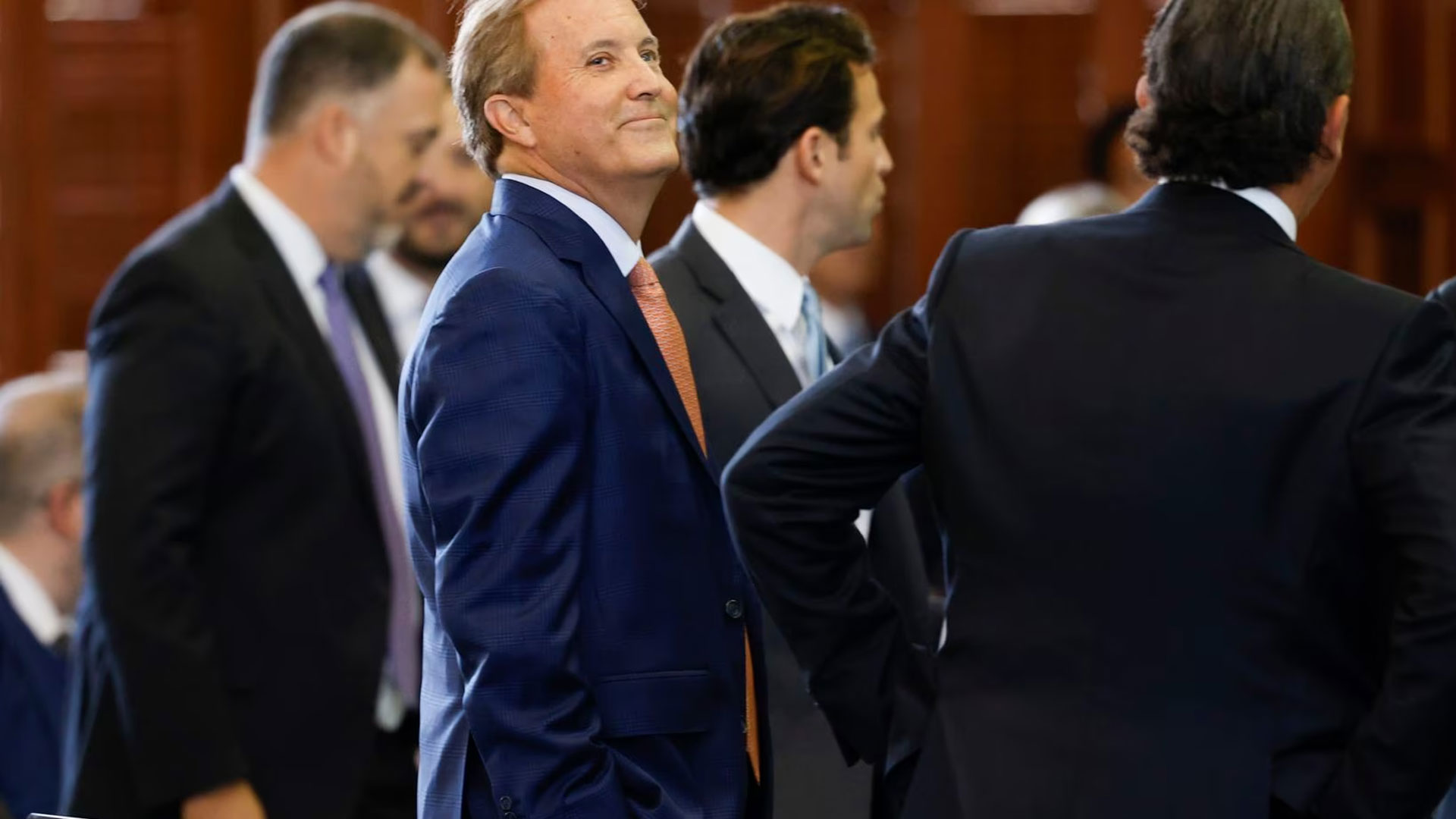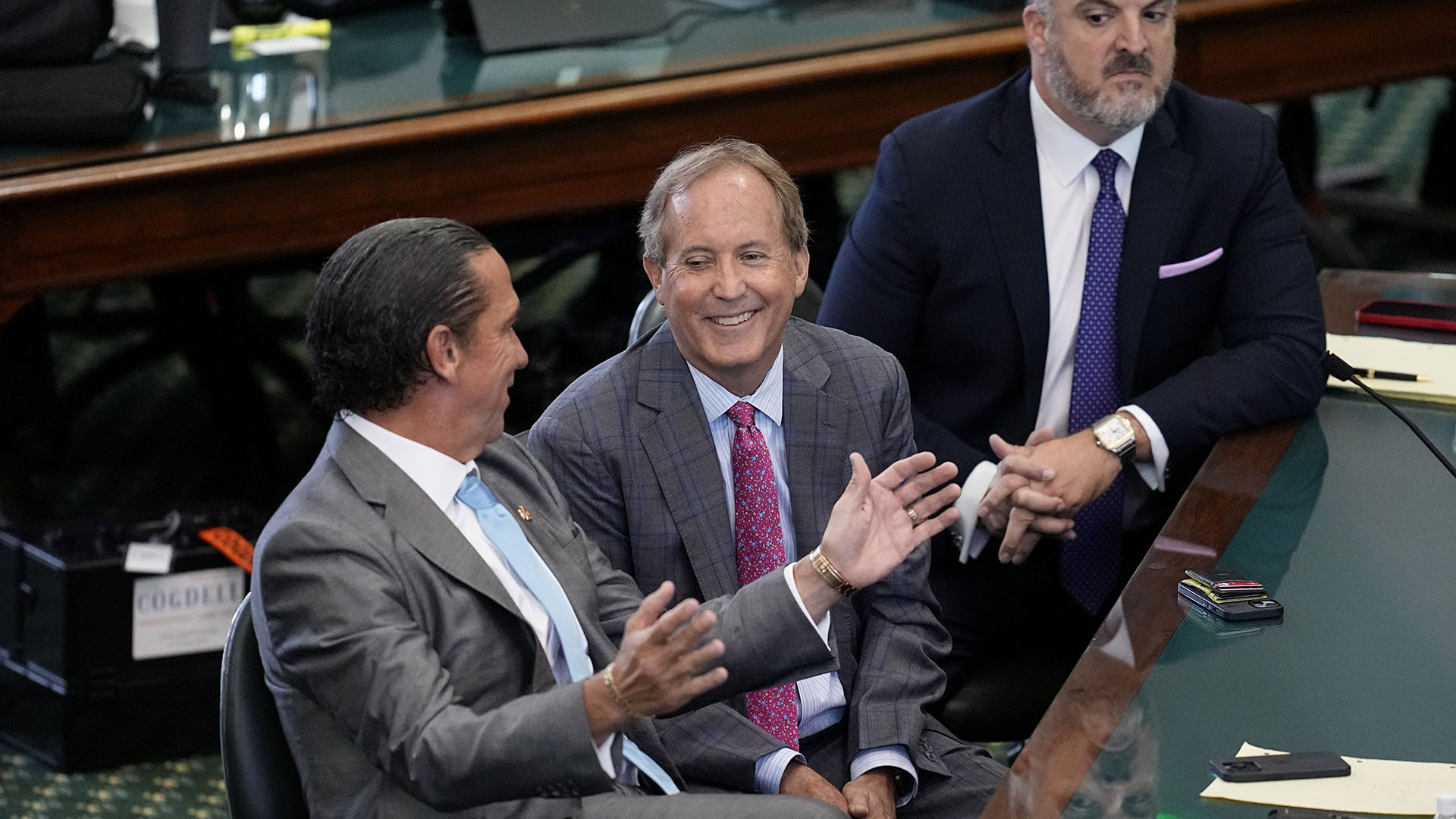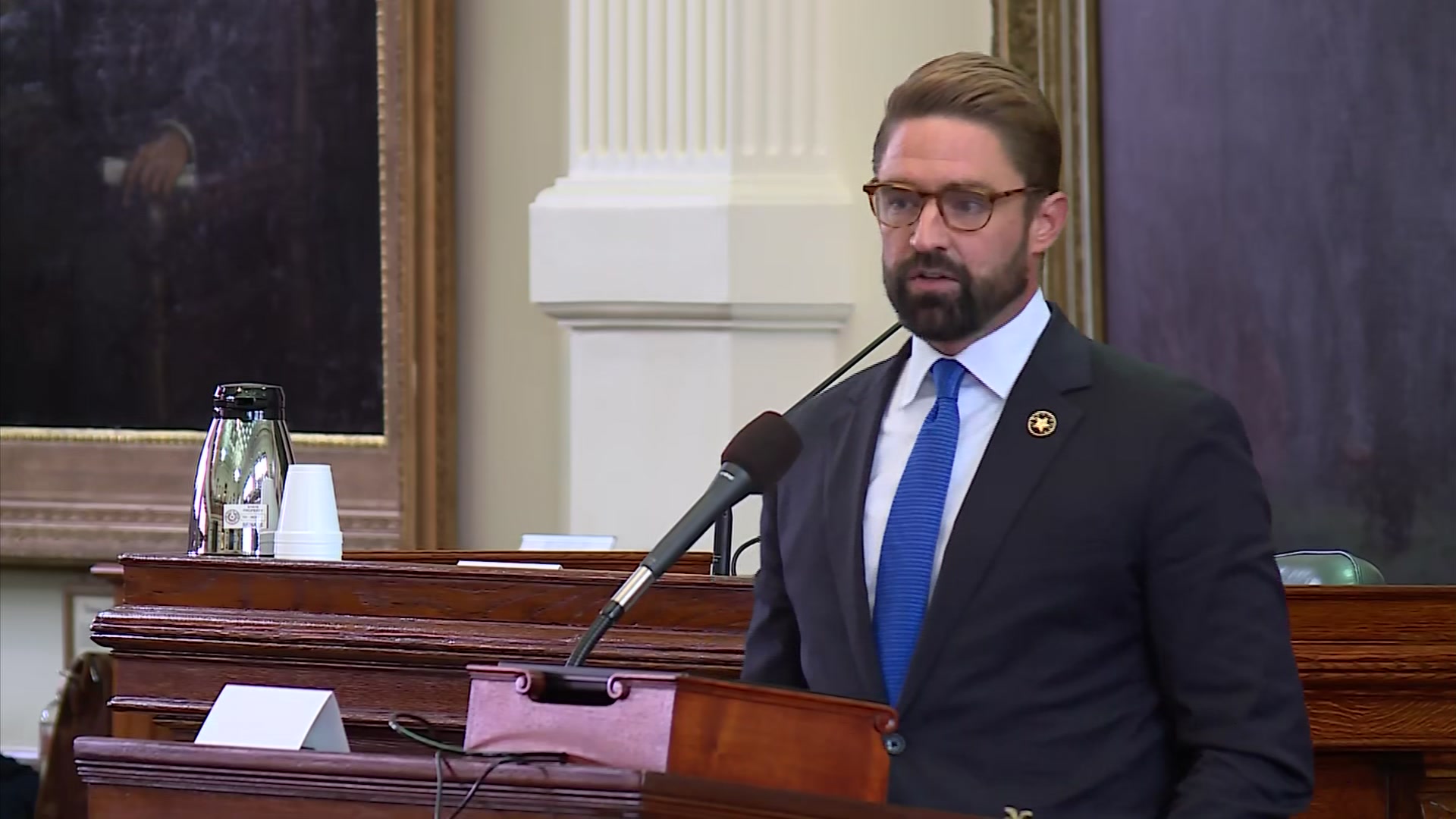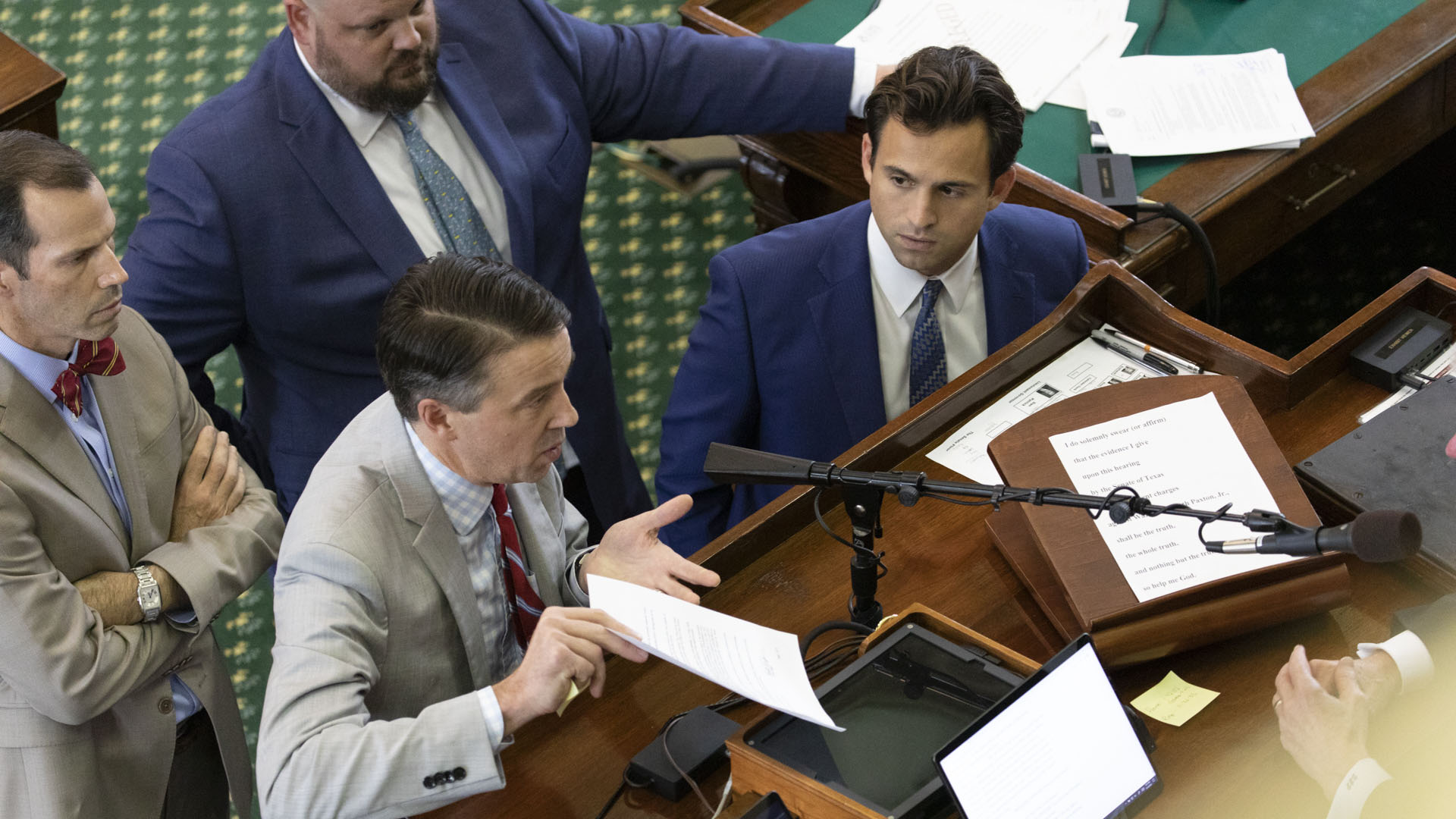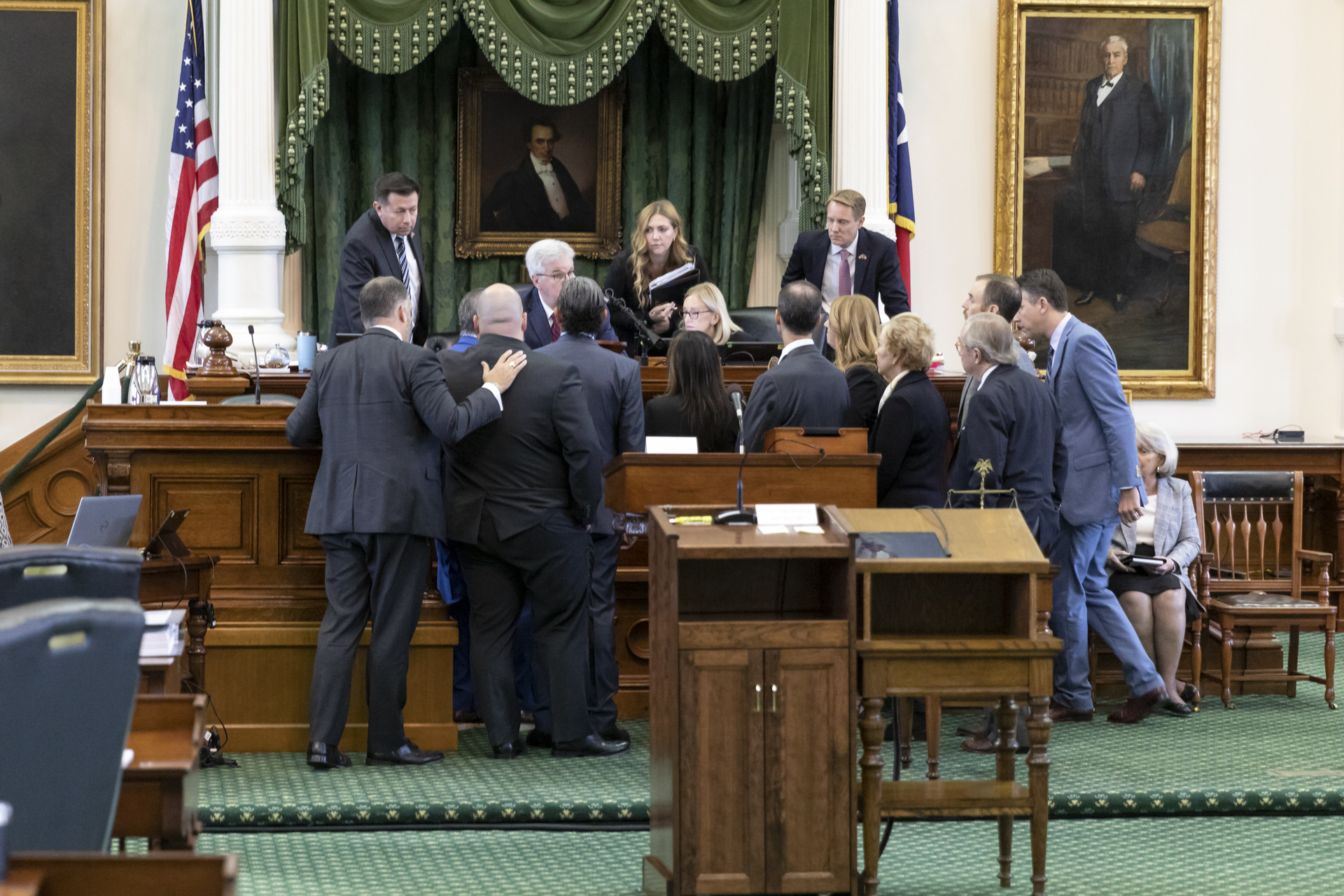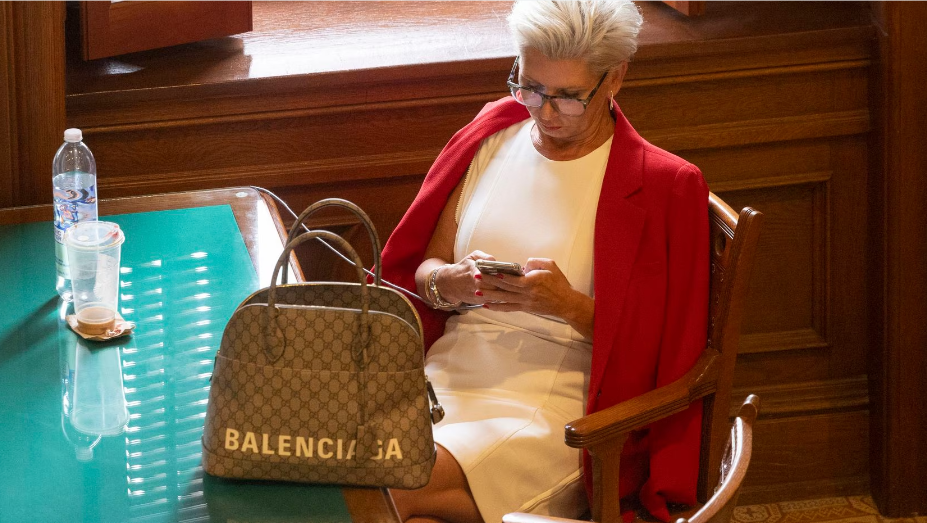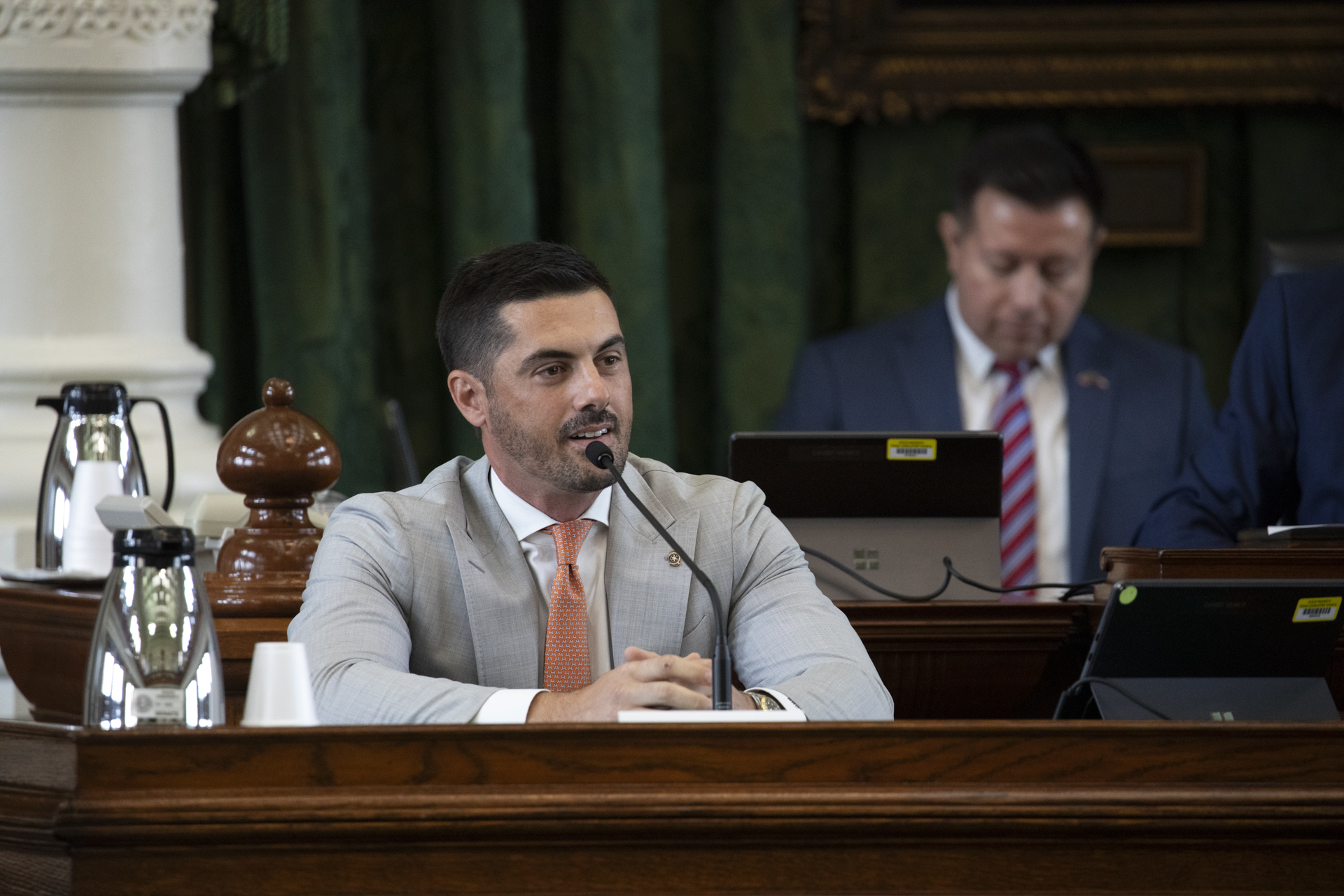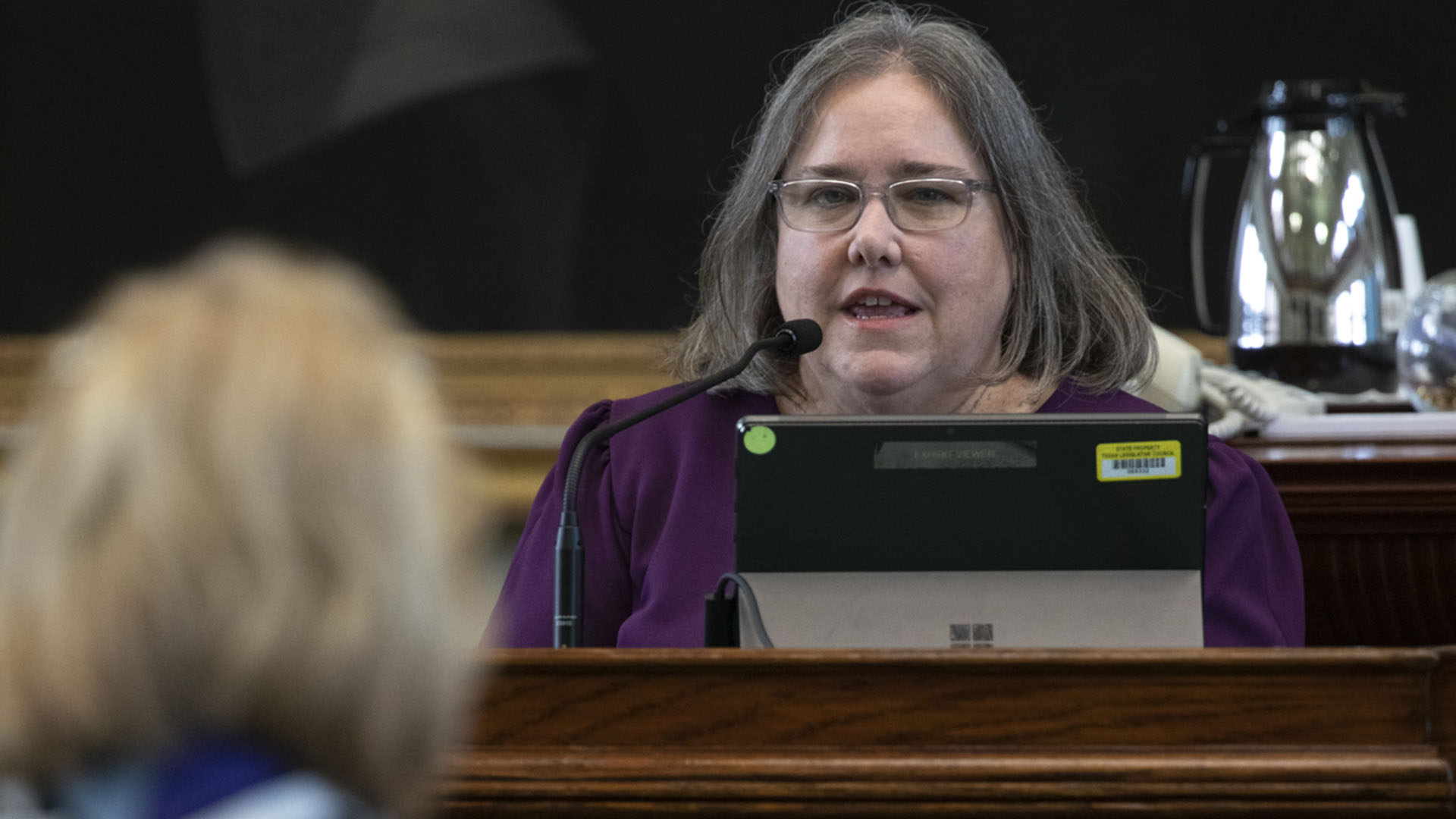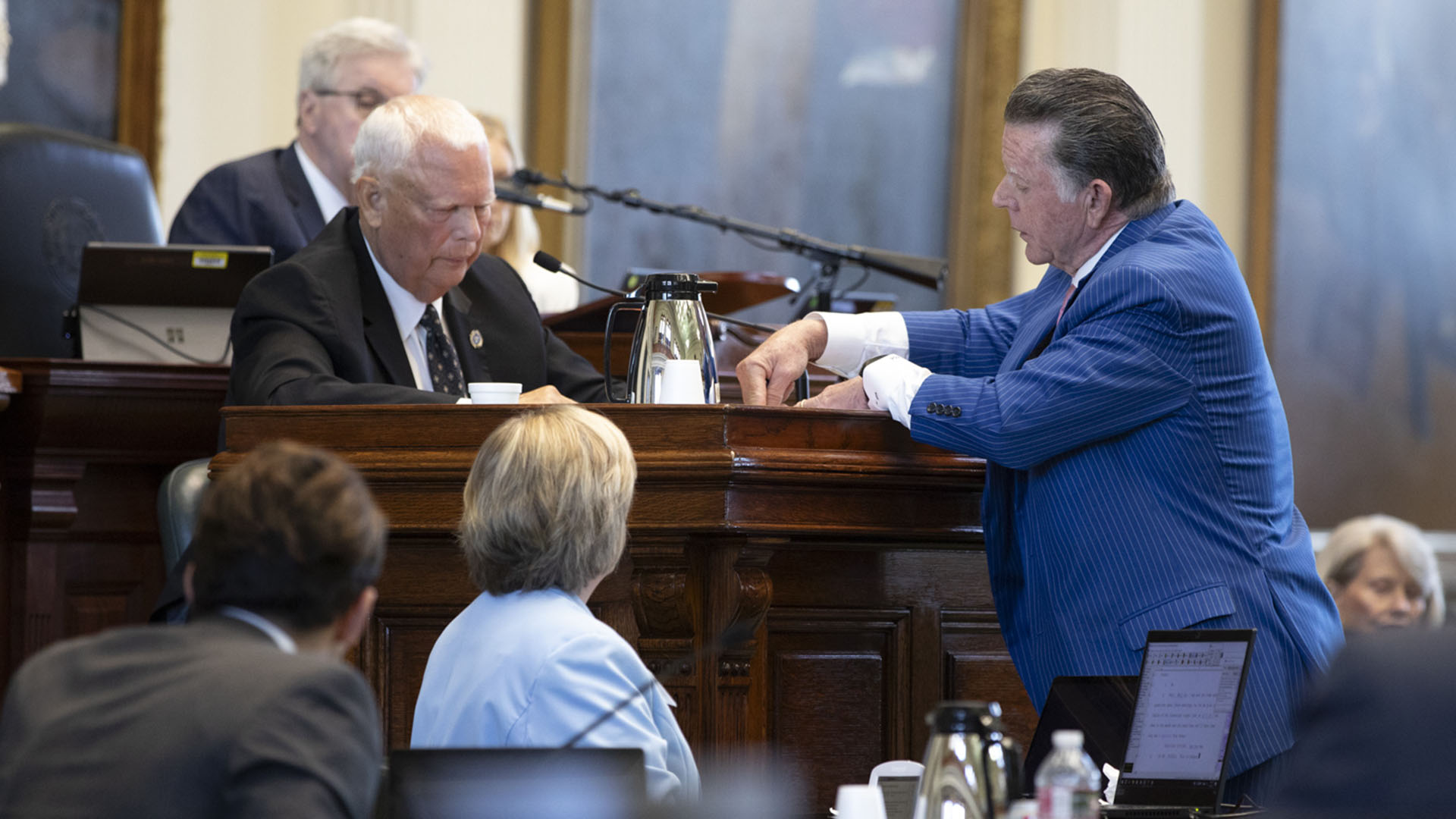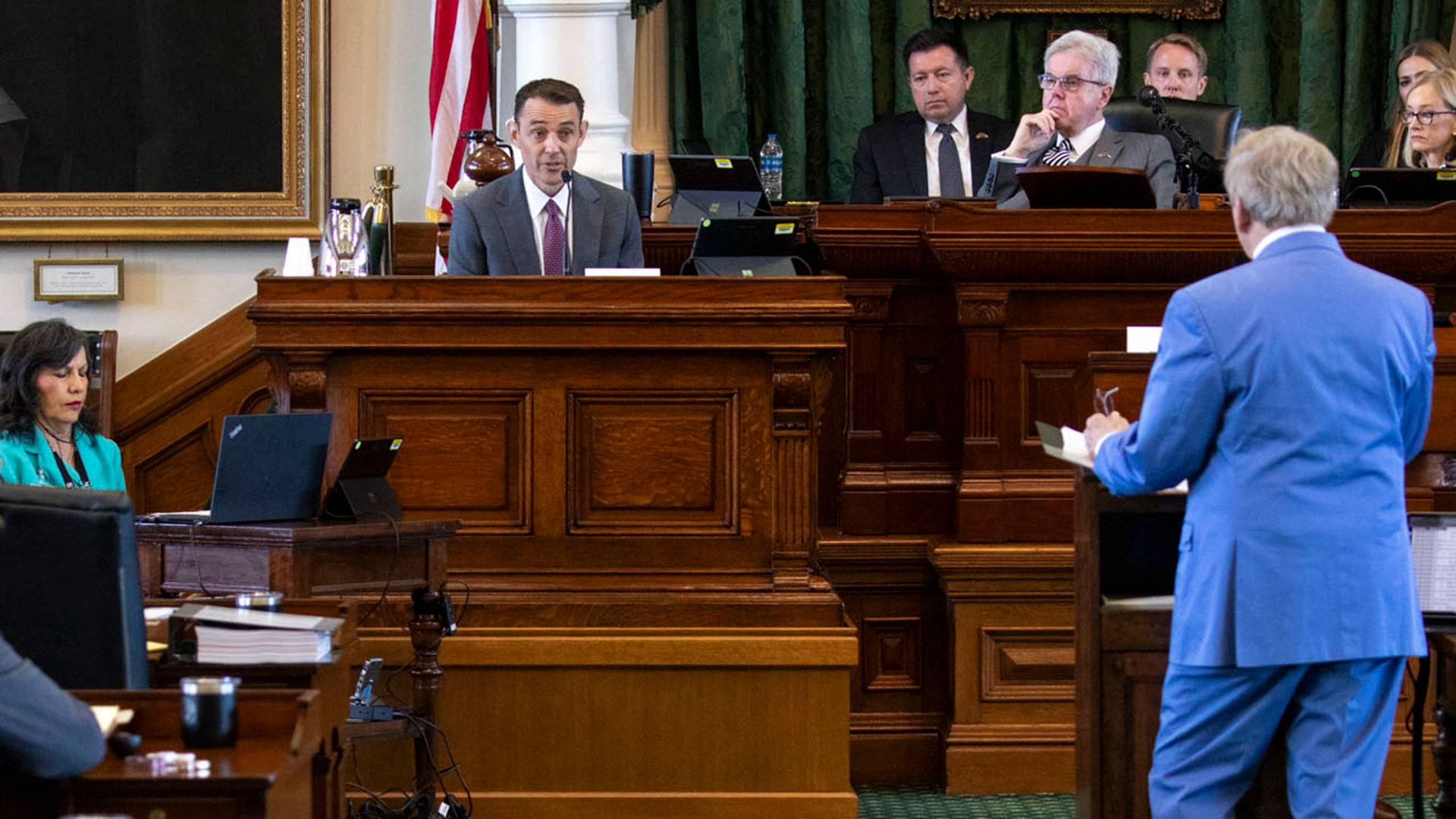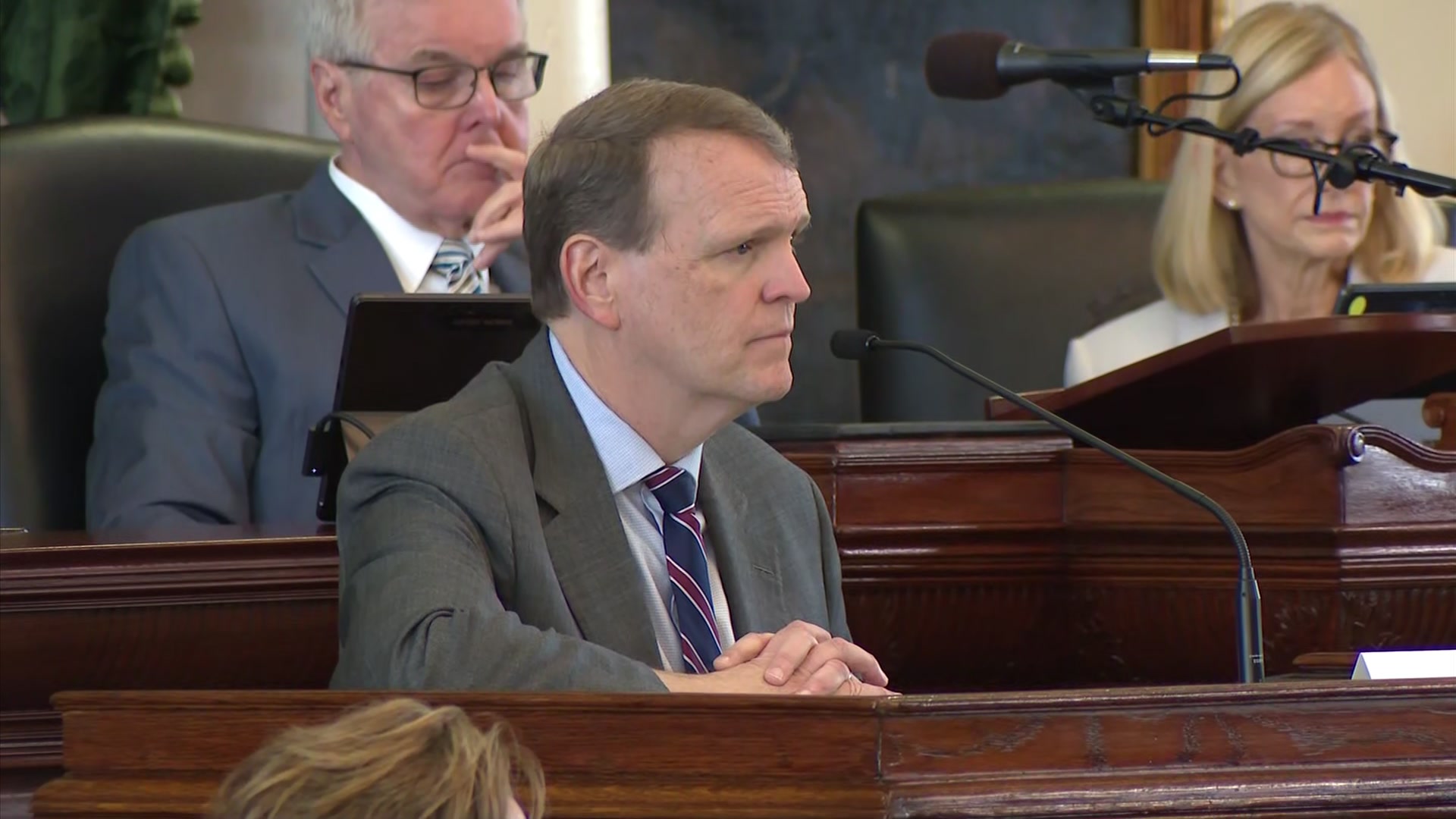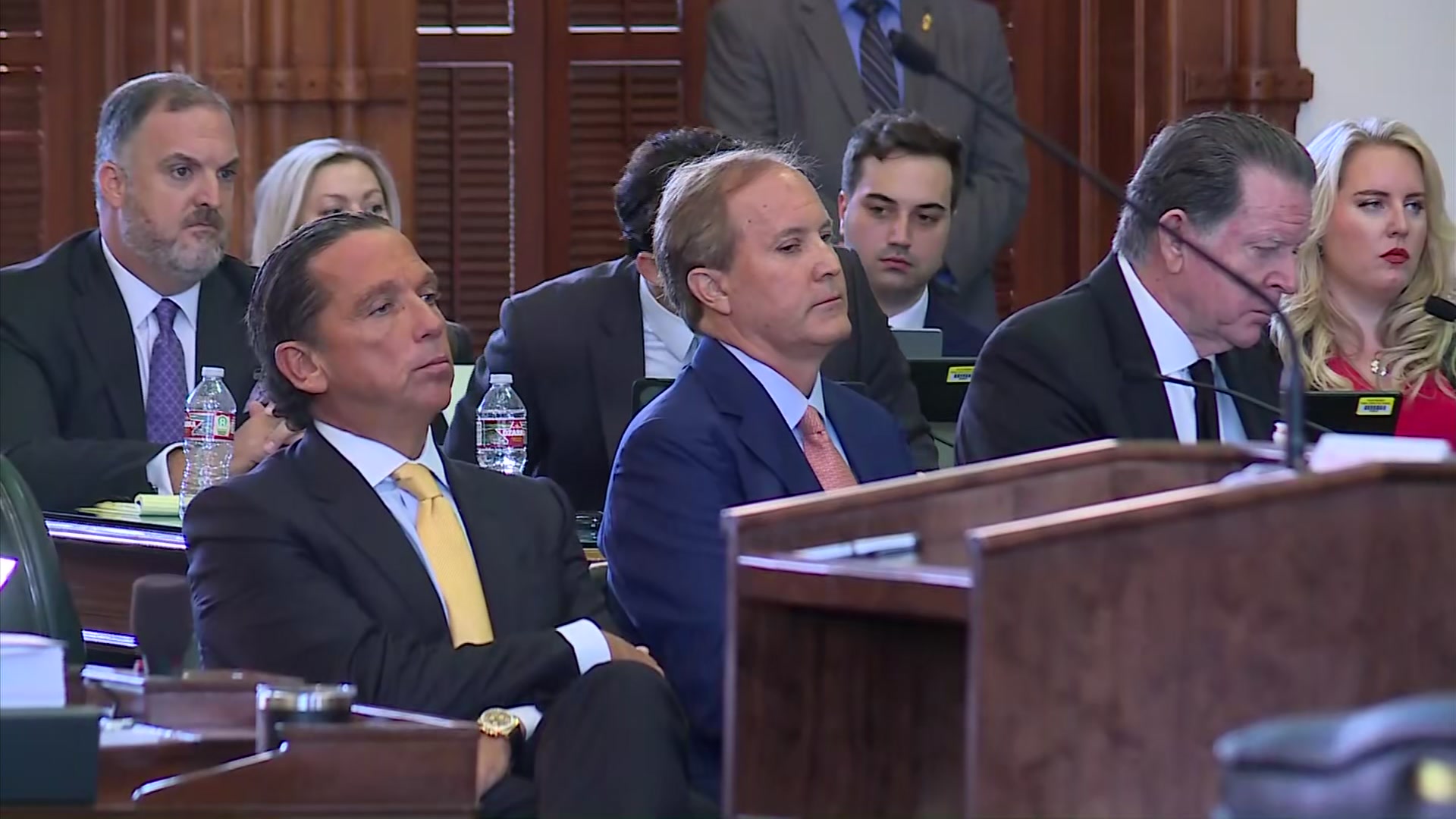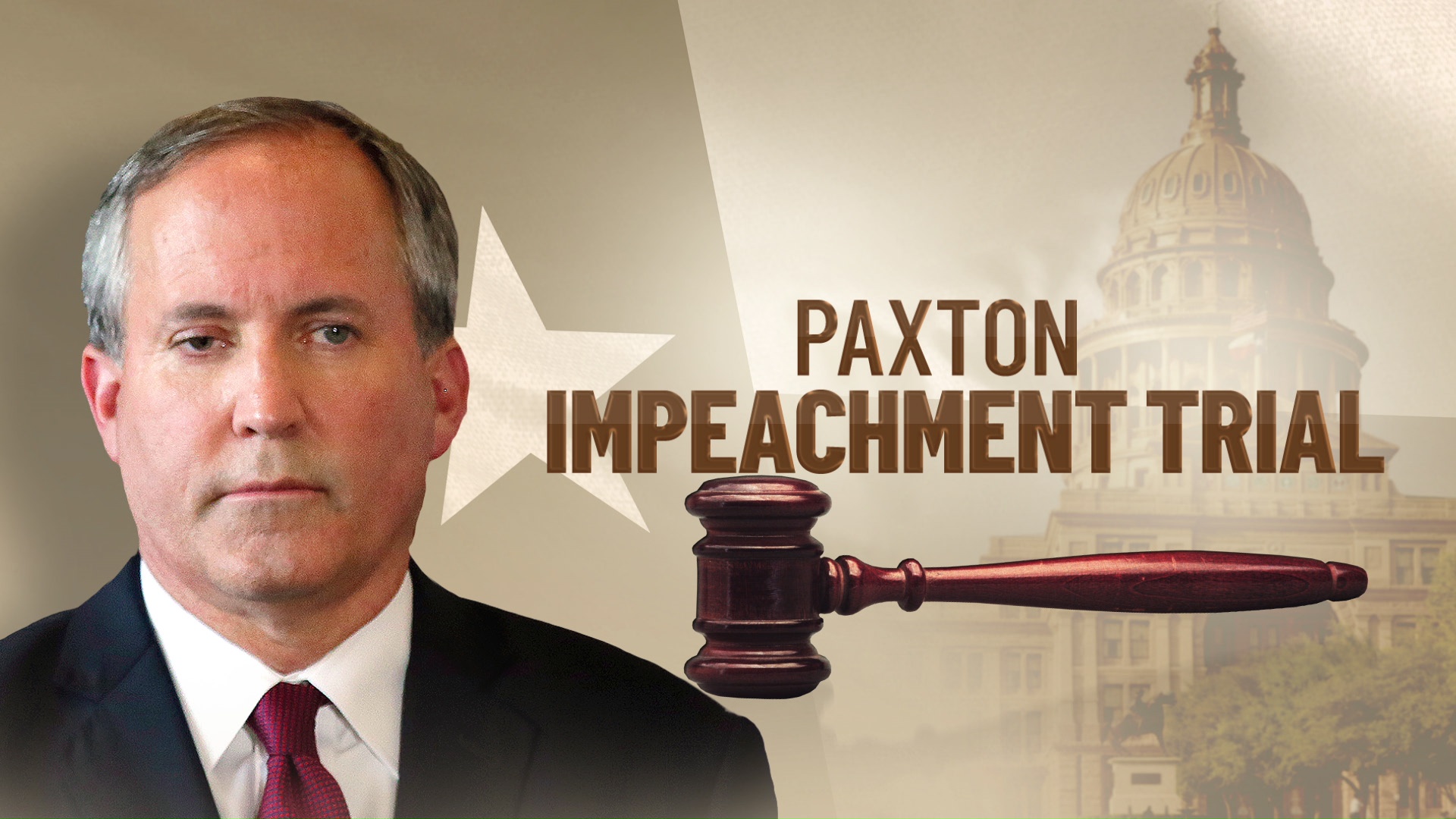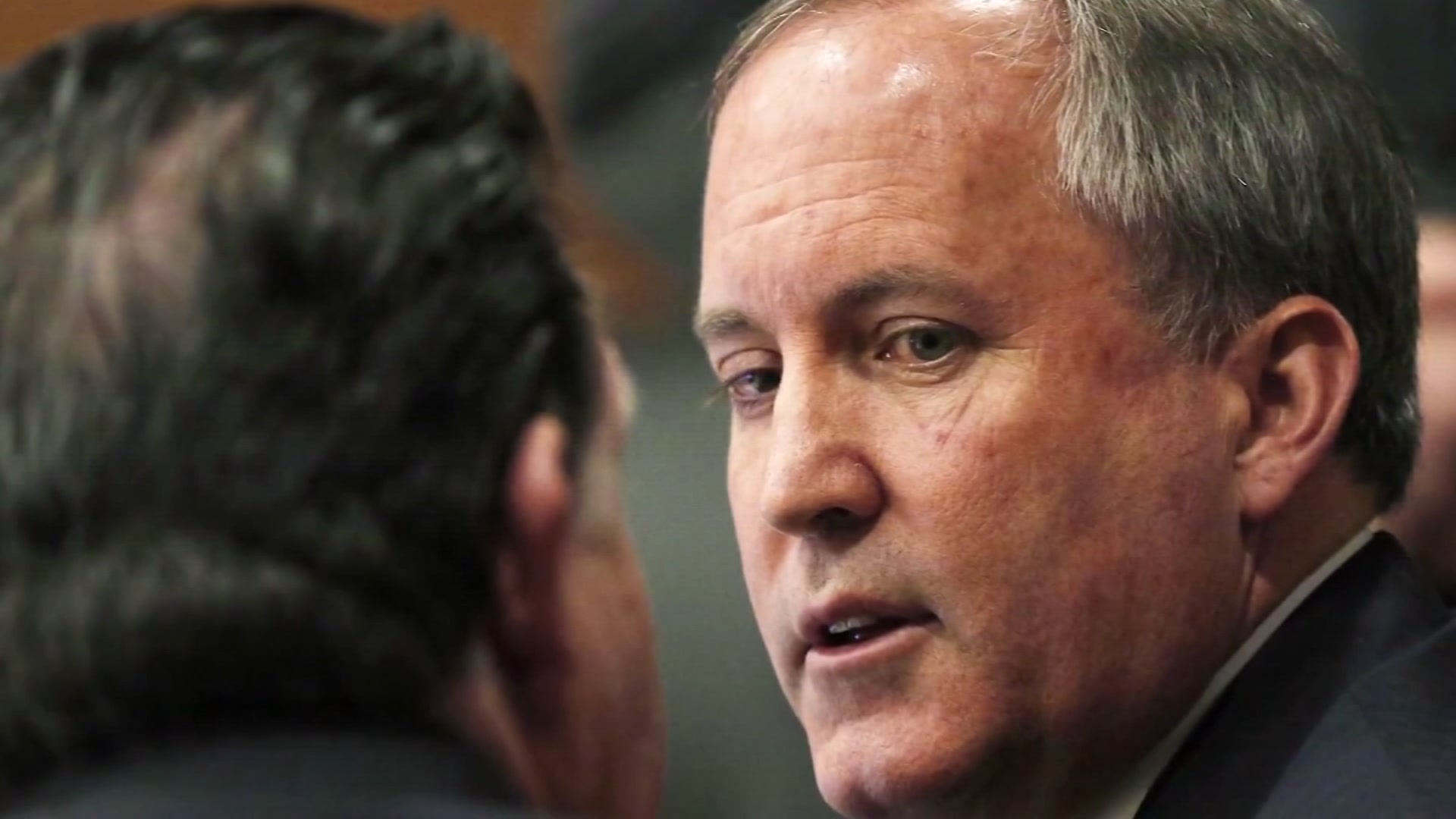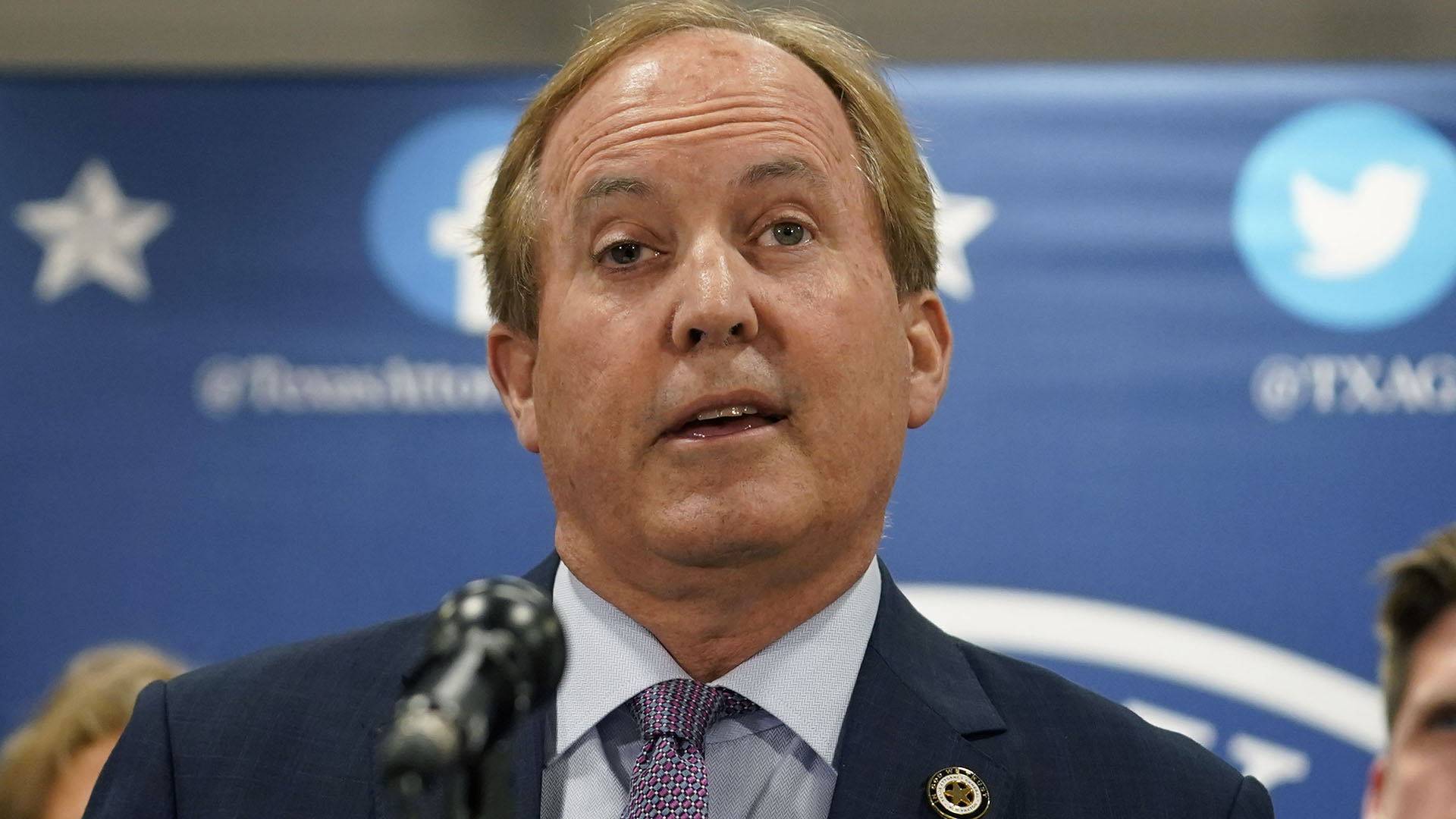Lawyers for impeached Attorney General of Texas Ken Paxton rested their case Thursday in the trial that will determine whether the Republican is removed from office winds down.
It was not until eight days into the trial that Paxton's defense attorneys began calling their own witnesses. The first was Justin Gordon the head of the Texas attorney general office's open records division, a branch of the agency that Paxton is accused of manipulating to help Austin real estate developer Nate Paul. The second witness Thursday was Austin Kinghorn, an associate deputy attorney general for legal counsel.
Attorneys for the bipartisan group of lawmakers prosecuting Paxton’s impeachment rested their case Wednesday after a woman who was expected to testify about an extramarital affair with Paxton made a sudden appearance at the trial, but never took the stand.
The affair is central to the historic proceedings and accusations that Paxton misused his power to help Austin real estate developer Nate Paul, who was under FBI investigation and employed the woman, Laura Olson. One of the 16 articles of impeachment against Paxton alleges that Paul's hiring of Olson amounted to a bribe.
Get top local stories in DFW delivered to you every morning. >Sign up for NBC DFW's News Headlines newsletter.
Olson was called to the stand Wednesday morning in the Texas Senate and waited outside the chamber. But her testimony was delayed for hours before Lt. Gov. Dan Patrick, who is acting as the trial’s judge, said toward the end of the day that Olson would not testify after all. He provided no further explanation but said both sides had agreed to it.
“She is present but has been deemed unavailable to testify,” Patrick said.
Shortly after the announcement, Rusty Hardin, a lawyer for the prosecution said he was resting their side of the case. Paxton attorney Tony Buzbee then moved to end the trial on the grounds of insufficient evidence, but later withdrew the request without a vote shorty before the trial adjourned for the day.
Paxton, who was suspended from office pending the trail's outcome, is not required to attend the proceedings and has not appeared in the Senate since testimony began last week. As the scene played out Wednesday evening, Paxton posted on social media that he was headed to Maine next week to talk with former Fox News host Tucker Carlson about “the last two weeks in Texas politics.”
“It should be interesting!” he said on X, the platform formerly known as Twitter.
So far, seven of the eight whistleblowers have testified in the trial with Blake Brickman being called to the stand Wednesday afternoon. Of the eight whistleblowers, only Lacey Mase was not called as a House witness.
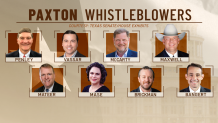
The whistleblowers are a group of former high-level staffers in Paxton's office who notified the FBI that they believed their boss was breaking the law in helping Austin developer Nate Paul. Paul claimed that he was a victim of illegal behavior by the Federal Bureau of Investigation with improper warrants served in a search of his home and business and allegedly asked for help from the AG's office.
Four of the whistleblowers filed a lawsuit over retaliation in November 2020 arguing Paxton violated the Texas Whistleblower Act. In early 2023, it was announced there had been a settlement reached in the lawsuit worth $3.3 million.
Paxton has been absent from the trial since pleading not guilty last Tuesday, but his wife Angela Paxton, a state senator, has been present though she is forbidden from voting on a decision. The rest of the Texas Senate will decide the case when all of the witnesses are heard.
Texas Lt. Gov. Dan Patrick serves as a judge for the trial and said Monday that he thought deliberations could begin as soon as Thursday. Patrick said they would not take a day off until they have a final resolution on the verdict.

DAY 8 UPDATES
6:15 p.m., Court adjourned for the day. Court will resume Friday at 9 a.m.., Patrick announced.
5:33 p.m., Paxton defense attorney Tony Buzbee announced that they had rested their case. The House rested its case on Wednesday. The next stage includes one hour for each side to rebut evidence and then one hour each for closing arguments. After that, it’s jury deliberations.
5:33 p.m., Dutko passed the witness and there was no redirect.
5:32 p.m., Dorfman confirmed that when he started at the OAG all of the whistleblowers had already been fired. He said he never interviewed them and he had no personal knowledge about what happened.
5:26 p.m., Dutko shows his copy of the business record affidavit with a Bates label affixed. Patrick and his advisors look over the document.

5:23 p.m., Dutko asks Dorfman if it's true that filing a plea of jurisdiction that it stays the case, meaning Ken Paxton didn't have to testify until the plea was heard. Dorfman agreed that no one had to testify at that time.
5:21 p.m., Dutko presents a business record affidavit but the defense again objects, saying the document wasn't able to be verified because there was no Bates label. The objection was sustained.
5:14 p.m., Dutko presents Dorfman with a document. Dorfman recognized the document as an email exchange he received. The defense said they didn't have the proper copy of the document. The questioning around the email was suspended while copies were produced.
5:13 p.m., Dutko asked Dorfman if he was shocked when he received the memo from Chris Hilton. He asked, "By what?" Dutko said, "By the fact that Mr. Hilton was attempting to usurp the power of Ken Paxton by removing his name from the letterhead." Dorfman replied, "No."
5:12 p.m., Osso passed the witness. Daniel Dutko begins cross-examination.
5:07 p.m., Dorfman said Ken Paxton would never be financially liable for the whistleblower lawsuit because he wasn't a named defendant.
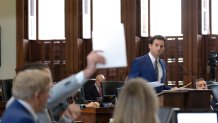
5:03 p.m., Osso asks Dorfman who is paying the lawsuit. Dorfman says the OAG pays it and the legislature has to fund that. It goes back to soverign immunity and that it has to be approved. To date, Dorfman said it has not been paid.
5 p.m., Dorfman said the settlement was a good assessment of their risk though it was more than they wanted to pay and less than the plaintiff's lawyers thought they would receive.
4:59 p.m., Dorfman said they entered mediation with the four plaintiffs and agreed to a $3.3 million payout for complete releases against the OAG. They also agreed to reinstate Ryan Vasser in his retirement plan and David Maxwell was to be reclassified from a plain discharge to an honorable discharge.
4:58 p.m., Dorfman said Ken Paxton gave him the authority to act on a settlement agreement.
4:50 p.m. Osso presents a document Dorfman said was sent to him and Chris Hilton from Ken Paxton giving him authority to settle. Dutko objected to the admission of the document and after conferring with his legal advisors Dan Patrick sustained the objection.
4:47 p.m., Discussing mediation with the whistleblowers, Dorfman said they were close to settling with three of the four and that James Brickman wanted to go to trial. Dorfman said they would rather have settled with all four and that it was good and bad when Brickman said he would join the settlement.

4:40 p.m., Osso moved to add the document into evidence, Dutko asked if he had the right document -- the one with the OAG seal that had Ken Paxton's name removed. Osso said it was the right one.
*The defense previously aruged the whistleblowers removed Ken Paxton's name from letterhead after going to the FBI as part of a coup. The witnesses said that wasn't the case and that there were many different styles of letterhead in the office.
4:39 p.m., Osso presents a document that Dorfman said was an internal memo prepared by Chris Hilton containing settlement statements from three of the plaintiffs in the whistleblower act case indicating that they felt like their case was strong and what they thought they would recover at trial.
4:38 p.m., Dorfman said he felt the OAG had a duty to explore a settlement even if it didn't come together.
4:36 p.m., Dorfman said parties agree to mediate because of risk and the desire to take a case out of a jury's hands.
4:33 p.m., Dorfman said talks began to settle the whistleblower case and to see if they could get a mediator to take part within the next two weeks. He said there was some incentive for both sides to settle before a court ruling might increase either side's risk.
4:31 p.m., Dorfman said had the Supreme Court taken the case they might have felt like the ruling would go in their favor because it's unlikely the court would take the case to affirm a lower court's ruling when they could just deny it and have the same effect.
4:29 p.m., Dorfman talks about what an appeal to the Texas Supreme Court looks like. The court takes only the cases they want so you have to convince them to hear the case. The appeal on the Third Court's ruling has not been ruled on.
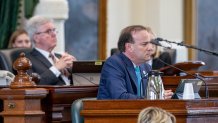
4:25 p.m. Osso asked Dorfman if facts or allegations from the whistleblowers became public and he said yes.
3:55 p.m., Lt. Gov. orders a 20-minute recess.
3:54 p.m., Dorfman said the Third Court of Appeals said the trial court did have jurisdiction on the whistleblower lawsuit and the OAG then appealed to the Supreme Court of Texas.
3:48 p.m., Dorfman said they believed the plaintiffs in the whistleblower claim did not meet their burden of establishing all of the elements of the claim and the state's soverign immunity still applied.
3:47 p.m., Regarding the plea to jurisdiction, Dorfman said the state is immune from the suit unless there's an expressed statutory waiver from the legislature.
3:45 p.m., Osso said the whistleblower lawsuit was filed in November 2020 and the OAG filed a plea to jurisdiction in January 2021 because they said the state couldn't be sued. Two years later, the OAG engaged in settlement agreements with the whistleblowers.
3:41 p.m., Dorfman said since he wasn't present with the events took place, he viewed hs role as one to verify that the statements in the reporte were corroborated.
3:38 p.m., Dorfman said he was working in the office when the reports were drafted. He said he revised and edited the document, front to back, and others did as well.
3:22 p.m., Dorfman said he was aware of two OAG reports but was not present for any of the events mentioned in those reports including an open records request involving Nate Paul, mitigation with the Mitte Foundation, an opinion on non-judicial foreclosures, and the hiring of Brandon Cammack.
3:19 p.m., Dorfman started with the OAG on Dec. 3, 2020.
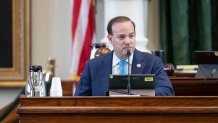
3:17 p.m., Dorfman says Austin Kinghorn told him about a job opening at the OAG. He said during the interview he asked Brent Webster direct questions about the office and the allegations against Ken Paxton.
3:11 p.m., Defense attorney Anthony Osso Jr. called Grant Dorfman to the stand. Dorfman, of Dallas, is the deputy first assistant at the OAG and is a former judge.
3:06 p.m., The witness was passed and there was no recross.
3:06 p.m., Hilton asked if agency policy supported the termination of Lacey Mays. He said it did and that he supported the termination to this day.
3:06 p.m., Dutko passed the witness. Hilton began redirect.

3:04 p.m. Dutko asks De La Garza to verify the termination dates of the whistleblowers and that they occurred within the 90-day window. He confirmed the dates.
3:02 p.m., Dutko shows a timeline of roughly 90 days. Dutko points to the whistleblower statute which he said says, in summary, that means if someone is terminated within 90 days of reporting to law enforcement the termination is presumed to be retaliatory.
2:59 p.m., Dutko asked De La Garza about using statements like "facts presented to me" and asked if he could have been given bad information from Brent Webster. De La Garza said it could have affected his analysis.
2:53 p.m., Dutko asked De La Garza about the Texas Whistleblower Act and if it protects only people who still have their job. Dutko asked De La Garza about a scenario where if someone told their boss they were going to go to the FBI and then got fired before they went to authorities would they be exempt from whistleblower protection. De La Garza agreed and was hesitant to answer if someone wanted to avoid retaliation that they should avoid telling their boss before going to law enforcement.
2:52 p.m., Hilton passed the witness and attorney Daniel Dutko began cross-examination.
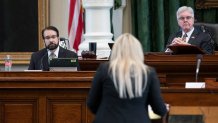
2:50 p.m., Hilton asked if either Webster or Paxton suggested the whistleblowers should be fired for going to the FBI and he replied, "Not to my knowledge."
2:48 p.m., Hilton asked if the OAG had legitimate non-retaliatory reasons for terminating the whistleblowers and De La Garza said yes.
2:45 p.m., De La Garza is asked about a memo he wrote, "Here is my list of why Vasser, Maxwell, Penley, Brickman, should be considered high-level policy makers who are exempt from whistleblower protection."
2:40 p.m., Hilton asked about Mark Penley, who he said had the option to resign before being fired. In addition to facts presented to him, applicable law, De La Graza said
2:39 p.m., De La Garza said based on the facts presented to him and applicable law it seemed reasonable to fire Maxwell. He said he supported it.
2:32 p.m., Regarding the termination of David Maxwell, De La Garza said the decision to fire him was also made by Webster. De La Garza said Maxwell failed to go to HR on sensitive matters that could have exposed the agency to liability.
2:31 p.m., De La Garza said when he was asked his opinion he recommended termination and he stands by that today.
2:28 p.m., De La Garza said of Vasser's firing, he had to rely on the facts presented to him by his boss regarding a lack of confidence, performance, insubordinate tone and demeanor and the mishandling of grants.
2:27 p.m., Hilton asked about Ryan Vasser and his termination. De La Garza said Webster also made that decision also and that he supported the decision.

2:25 p.m., Hilton asked who made the decision to terminate Brickman and De La Garza said it would have been Webster. De La Garza said he supported the decision.
2:22 p.m., De La Garza said following his report to law enforcement, Brickman engaged in unacceptable conduct including violations of agency policy that justified termination including having an insubordinate tone with a new boss and not following the directives of a new boss.
2:20 p.m., De La Garza said Blake Brickman was "involuntarily separated."
2:19 p.m., De La Garza said Ryan Bangert resigned as of Nov. 4, 2020, and that Darren McCarty resigned as of Nov. 4, 2020.
2:19 p.m., De La Garza said the other whistleblowers then reported to Webster, as of Oct. 5, 2020.
2:17 p.m., De La Garza was asked about Jeff Mateer, first assistant attorney general. who resigned on Oct. 2, 2020. De La Garza said Paxton then appointed Brent Webster.
2:16 p.m., De La Garza said employees who fail to follow polices could face corrective action, disciplinary action including "involuntary separation," ie, termination.
2:16 p.m., De La Garza is asked about a policy he wrote regarding the use of an insubordinate or unprofessional tone toward management for the policies and procedures handbook. He said he wrote the policy in 2013. He said it was included because it seemed typical for employee manuals to outline appropriate and inappropriate conduct.
2:13 p.m., De La Garza said OAG employees are "at will" employees which means an employee can be fired for any reason.
2:08 p.m. Technical issues in the courtroom ...
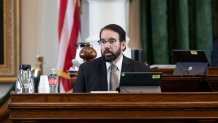
2:07 p.m., De La Garza said people appointed to positions at the OAG are expected to follow the same policies and procedures as other employees.
2:04 p.m., He's asked about the OAG staffers who went to the FBI to report Ken Paxton and then later filed a Texas Whistleblower Act lawsuit against the OAG. De La Garza said the case is still pending in Travis County.
2:03 p.m., De La Garza is asked if he's ever taken a whistleblower act claim to trial and he said yes. He then explains the qualifications for a whistleblower claim.
2 p.m., De La Garza talks about this responsibilities for the OAG, an agency with more than 4,000 employees across the state.
1:56 p.m., Court is back in session. Defense attorney Amy Hilton called Henry De La Garza, HR director, chief employment counsel and ethics advisor for the Office of the Attorney General.
12:30 p.m. Court is in recess for lunch until 1:30 p.m.
12:20 p.m. Defense passed the witness for recross, and the prosecutors declined. Attorneys for the prosecution and defense approached the bench to speak with Patrick.
12:19 p.m. Defense attorney Chris Hilton asked if Kinghorn was aware of documents relating to a Proton email or Signal account for Paxton. Kinghorn said he was not. Hilton asked if Kinghorn was required to produce documents that did not exist. Kinghorn said he was not.
12:18 p.m. Prosecution passes the witness to the defense for redirect.
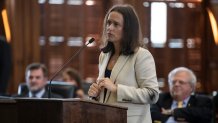
12:16 p.m. Epley referenced that Kinghorn had suggested that Paxton was not beholden to Texas State Bar rules. Kinghorn said he did not recall doing so.
12:13 p.m. For several minutes, Epley asked Kinghorn a series of questions relating to his credibility. Kinghorn refused to answer the majority of the questions. Epley asked Kinghorn if his opinion on the OAG's investigation was not relevant because he refused to answer the questions. Kinghorn said that was not the case.
12:07 p.m. Kinghorn said he was promoted after Vassar was fired. When asked about a contract with Cammack and why he wasn't paid, Kinghorn said the contract was "closed" at the time Cammack called asking about payment. When Epley suggested there was a "secret contract" only signed by Paxton, a series of objections followed from the defense.
12:06 p.m. Kinghorn said the most important part of his job as a public servant is to "faithfully serve [his] principal and the people of Texas." Epley asked who Kinghorn viewed as his client, but the defense objected to the line of questioning.
12:05 p.m. Kinghorn said he recalled speaking to Epley about the Proton email account, though he said he did not provide any of Paxton's Proton or Signal documents to the prosecution.
12:02 p.m. Kinghorn said he was aware that a PIA request had been filed for Paxton's texts. He is not aware of PIA requests for his email or Signal app communications.
12:00 p.m. When asked what the purpose of an EAM is, Kinghorn said it was to gain approval about an action that is taken within the agency. He says signing an EAM means there is legal authority for the action and not necessarily that the action is a good idea.
11:59 a.m. Kinghorn said he never received pressure to put the contents of his conversations with Epley in Attorney General's Office filings. Epley suggested the contents of their conversations had appeared in subsequent filings, and the defense repeatedly objected to the line of questioning.
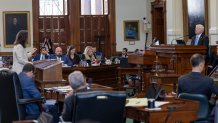
11:58 a.m. Erin Epley began to question Kinghorn. Kinghorn said he was Epley's contact to get documents at the AG's office, but their actions have since gotten "chillier" but they still "played nicely with one another."
11:57 a.m. Defense passed the witness to the prosecution from cross-examination.
11:56 a.m. Kinghorn said he was not aware of Paxton accepting a bribe from Nate Paul or of his involvement with Laura Olson. He also said he had no knowledge of a "vast criminal coverup."
11:55 a.m. When asked if an audit was the same thing as a coverup, Kinghorn said it was not.
11:52 a.m. Kinghorn said the AG's office has been contacted by the state auditor's office about the settlement of the whistleblower's suit, and the findings will be presented to the legislature.
11:49 a.m. Kinghorn said "Not a single dime of taxpayer money" has been spent on the settlement of the whistleblower's suit.
11:48 a.m. "There has been extensive reporting on the issues discussed in that report," Kinghorn said.
11:47 a.m. Kinghorn said he was not aware that Paxton directed the employees of his office to "direct a sham report." The report has been on the AG's website continuously since it was published, Kinghorn said.
11:45 a.m. Kinghorn said he was aware of the AG's office internal report that included the findings of a 10-month investigation concerning the allegations that the whistleblowers raised. Kinghorn said he reviewed the report two or three times. He said he was never directed to make sure the report was a sham or that it included false or misleading statements.
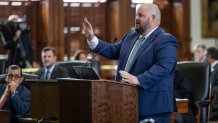
11:42 a.m. Kinghorn said he followed up with Cammack in response to his inquiry about how Cammack could process his invoices. Cammack's findings had not been completed at that time, and Kinghorn said Cammack could not be paid until he had made good on his end of the contract. Kinghorn said he never heard back from Cammack.
11:40 a.m. Kinghorn said he was not involved with the hiring of Brandon Cammack. He said he became involved with Cammack after Cammack's employment had ended. Kinghorn said he was made aware of a phone call from Cammack asking about payment after Kinghorn had been promoted to general counsel in November 2020.
11:37 a.m. After a brief disagreement over whether several documents were already in evidence, Kinghorn was shown a letter from 2020 relating to golf courses during the COVID-19 pandemic. The letter, which is an informal opinion, was signed by Ryan Vassar. Kinghorn said the nature of the letter was similar to that of the foreclosure opinion.
11:32 a.m. Kinghorn said the AG's office put several other pieces of guidance out about COVID-related topics that were similar to the foreclosure opinion.
11:29 a.m. An authorized requester can request a formal statutory opinion from the AG's office, Kinghorn said. Chairs of legislative committees, senators, and house members are all authorized requesters.
11:28 a.m. Kinghorn said the AG's office was on the "cutting edge" of COVID-19 legislation during 2020. He said it was not unusual to have short deadlines, particularly during COVID.
11:26 a.m. Kinghorn said that the letter was nonbinding as it related to foreclosures, but he could not say whether or not it "shut down" foreclosures.
11:23 a.m. Hilton mentioned the foreclosure guidance letter. Kinghorn said he worked on the letter in a limited capacity but did not help to draft the letter. He was asked to help with the letter by Ryan Vassar.
11:20 a.m. Kinghorn was shown an EAM. He said the signature of Mary Henderson on the document showed that she approved of the EAM, but said that he was not sure if Henderson ever spoke to Paxton. Josh Godbey also signed the EAM, which also showed his approval. Darren McCarty and Jeff Mateer also signed the EAM.
11:17 a.m. Hilton mentioned the signing of an EAM, which is an Executive Approval Memorandum, as it related to the Mitte Foundation. Kinghorn said if someone at the AG's office signs an EAM, it means they approve it.
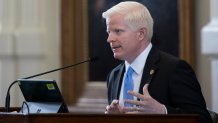
11:15 a.m. Kinghorn oversees 19 employees. He said he was proud of his time at the AG's office. When asked by defense attorney Chris Hilton if he was a RINO or a "Republican In Name Only," Kinghorn said, "I've been called a lot of four-letter words, and that's not one of them." Hilton: "On a scale of one to ten, how conservative do you think you are?" Kinghorn: "Eleven."
11:13 a.m. Court resumes. Defense calls witness Austin Kinghorn, an Associate Deputy Attorney General for Legal Counsel.
10:45 a.m. Prosecution declined to re-cross the witness. Court is in recess until 11:05 a.m.
10:44 a.m. Defense asked Gordon if either party could have filed a lawsuit challenging the outcome. Gordon said yes, and confirmed neither party ultimately filed a lawsuit.
10:43 a.m. Prosecution passed the witness to the defense for redirect.
10:42 a.m. Gordon said probable cause affidavits and search warrant affidavits have different exceptions for when they can be released to the public.
10:40 a.m. Gordon recalled previous testimony saying that withholding the requested information "would have been detrimental to the requester." Gordon said he recalled having the entire DPS report in his possession, but he said the probable cause affidavit would not have been included after the ORD made their ruling.

10:37 a.m. Gordon said Ken Paxton summoned him to his office to talk about the release of the documents. Gordon said Paxton did not pressure him. He said he could not recall another time he could not recall another time when Paxton came to him about the release of documents. He said the ORD did not rule against the requester in this case, which was in essence what Paxton wanted.
10:36 a.m. Prosecutor Leah Graham began questioning Gordon.
10:35 a.m. Defense passed the witness for cross-examination.
10:32 a.m. The defense moved to have the unredacted brief admitted into evidence. The prosecution objected once again, and disagreement continued.
10:31 a.m. After the ORD rules on a request, they send the document back to the governmental body and do not keep a copy of the documents, Gordon said.
10:30 a.m. Gordon said Larson continued to seek information through Texas agencies in August 2020.
10:27 a.m. Gordon said the FBI did not address the request for additional documents or why the document should not be released to the public, and therefore the unredacted brief was released to the public.
10:25 a.m. Gordon said the documents suggest that the FBI itself provided a copy of the redacted 2020 brief to Larson. The document did not say the redacted brief should be withheld from the public, Gordon said. He said the comments in the document did not address the information being sought.
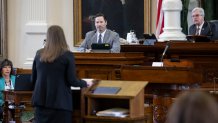
10:21 a.m. Gordon said a note in the document indicates that the first brief was sent to Larson redacted. The document suggests that an unredacted version of the document was sent to Lawson when he requested additional documents.
10:20 a.m. Gordon confirmed that there is no search warrant in the unredacted brief. He also said there are no emails between the FBI and DPS or victim information inside the file. He said if the redacted brief had been released to one requester, it would be released to other requesters.
10:19 a.m. Court resumed after the attorneys' discussion with Patrick.
10:08 a.m. The prosecution and defense attorneys disagreed again about the use of the unredacted brief once again. Both legal teams approach the bench to discuss the documents with Patrick.
10:06 a.m. Gordon said he had worked with Larson in the past and that it was unsurprising that he submitted a request for additional documents.
10:02 a.m. The defense presented Gordon with a copy of the unredacted brief. When asked if there is confidential in the document, he points out that Larson's email is at the end of the document. He said other than that, there is no confidential information.
9:58 a.m. Gordon said he recalled receiving a request for the copy of the unredacted brief from Joe Larson. He said the closed letter did not result in the release of any additional documents.
9:55 a.m. Gordon explained that their ruling could have been seen as condoning the type of heavy redaction given to Paul if they had not released a closed letter.
9:53 a.m. Gordon said he agreed with the decision to release a closed letter to Paul following the open records request.
9:49 a.m. When Gordon was asked if these redactions were a violation of the PIA, Gordon said yes. Gordon said failure to submit a representative sample on time, the second sample that was different than the initial sample, the failure to notify the third party on time, and the redacted document were examples of "procedural violations" in this case.
9:46 a.m. According to Gordon, Section 552.007 of the Texas Government Code prevents the selective release of documents in an open records request. Gordon was given a copy of the redacted document that was given to Paul. He said it was a fair and accurate representation of the document. He said the entire brief, as well as the substantive arguments, are redacted, which is unusual.
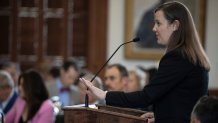
9:45 a.m. After several minutes of discussion with Patrick, court resumes.
9:29 a.m. The prosecution objects to the admission of certain evidence because it has identifying evidence that has not been released "to the world at large." Attorneys for the prosecution and defense approached the bench to speak with Patrick.
9:28 a.m. Gordon said because the documents and third-party notice were late, the office gave themselves a 10-day extension on the request. Typically, the third party in these requests (in this case, the FBI) will provide comments about the request. Gordon said the office received an unredacted copy of the FBI's comments, but Nate Paul said his copy of the FBI's comments was completely redacted.
9:26 a.m. Gordon said the notice provided to the FBI was also late. He said he did not recall how the second said of documents were provided to him.
9:24 a.m. Gordon said under the procedural requirements, the documents from the second sample were late. He said as a penalty, the requester waives their exception for the set of documents requested.
9:21 a.m. Gordon pointed out the procedural irregularities. He said as the office was reaching its deadline to reply to the request, the office received a follow-up request and additional documents as part of a representative sample. He said the new documents were "substantially different" than the original documents and "of a different character."
9:20 a.m. Gordon said he received the file on March 13, 2020. He said DPS sought to withhold the files relating to the request under the law enforcement exception.
9:18 a.m. Gordon also said he recalled a request in 2020 on behalf of Nate Paul. Gordon said he created a summary of Paul's request after he received it. He described the request as relatively routine in the beginning, but as the ruling was being reviewed, it "took a turn procedurally," Gordon said. He described the file as "unique" due to procedural issues.
9:15 a.m. Gordon said he recalled an open records request from the Texas State Securities Board on behalf of Nate Paul in 2019. He said no records were given to Paul, but he recalled a request for reconsideration that followed Paul's request. Gordon said such reconsideration requests are common.
9:14 a.m. Gordon started working in the Attorney general's office in 2015. He estimated that the division handles approximately 40,000 open records requests annually.
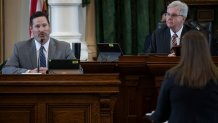
9:13 a.m. Defense attorney Allison Collins begins questioning Gordon.
9:12 a.m. Defense calls witness Justin Gordon. Gordon is the chief of the Open Records Division of the Attorney General's office.
9:10 a.m. Attorneys for the prosecution and defense approached the bench to speak with Patrick.
9:08 a.m. Court began with a prayer led by Sen. Bryan Hughes from District 1.
9:06 a.m. The jury was called to enter.
9:05 a.m. The Senate was called to session and Lt. Gov. Dan Patrick entered the chamber.
WHY IS PAXTON ON TRIAL?
The Republican-led Texas House of Representatives voted overwhelmingly in May to impeach the attorney general, largely based on his former deputies' claims that he used his power to help a wealthy donor who reciprocated with favors including hiring a woman with whom Paxton had an extramarital affair. The 20 articles of impeachment brought forth by the Texas House include allegations of abuse of public trust, unfitness for office and bribery. The Texas Senate is holding four of the articles in abeyance because they are largely related to the 2015 criminal charges where Paxton has been accused of felony securities fraud. Paxton has pleaded not guilty in that case but so far there has been no trial.
If convicted in the impeachment, Paxton would be removed as attorney general and could be barred from holding future elected office in the state.
THE LATEST IN THE KEN PAXTON IMPEACHMENT TRIAL
Below are some of the headlines from the historic nine-day impeachment trial.
KEN PAXTON IMPEACHMENT TRIAL
What to know about the historic impeachment of Texas Attorney General Ken Paxton.

